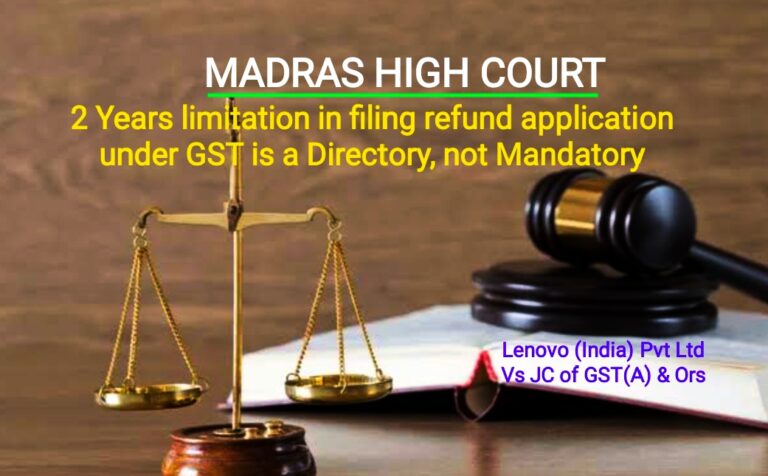Two Years Limitation in GST Refund Application Filing is Directory, Not Mandatory: Madras High Court Order for Lenovo (India)
In a significant ruling, the Madras High Court has declared that the stipulated two-year limitation for filing Goods and Services Tax (GST) refund applications is directory, not mandatory. The judgment, delivered by Justice Krishnan Ramasamy in the case of M/s. Lenovo (India) Pvt Ltd versus JC of GST(A) & Ors on November 6, 2023, sheds light on the interpretation of Section 54(1) of the Central Goods and Services Tax Act (CGST Act).
Section 54(1) provides the assessee the opportunity to “make application before two years from the relevant date in such form and manner as may be prescribed”. Justice Ramasamy’s interpretation emphasizes that while the application ideally should be made within two years, strict adherence to this timeframe is not obligatory. The court stressed that under specific circumstances, refund applications could be entertained even beyond the stipulated two-year period.
The crucial aspect of the judgment lies in categorizing the time limit specified in Section 54(1) as directory and not mandatory. Consequently, the court asserted that denying a legitimate refund claim solely on the basis of filing the application beyond the two-year limit is unwarranted, especially in appropriate cases.
The case involved Lenovo (India) Pvt. Ltd., a company engaged in manufacturing and importing computers, seeking a refund of Integrated Goods and Services Tax (IGST) paid in accordance with Section 16 of the Integrated Goods and Services Tax Act, 2017. The petitioner’s refund applications were partially rejected by the tax department, a decision upheld by the Appellate Authority.
Lenovo (India) Pvt. Ltd. argued that their refund applications were valid, citing their status as a Domestic Tariff Unit (DTA Unit) supplying goods and services to Special Economic Zone (SEZ) units during the relevant months. The rejection, according to the petitioner, was based on an erroneous consideration of the date of endorsement in Statement-4, and the delay in filing the Revised Statement-4 was deemed time-barred by the department.
The court, in setting aside the tax department’s findings, clarified that rejection on the grounds of incomplete or inappropriate endorsement was not tenable. Importantly, it highlighted that filing a claim after two years does not automatically invalidate the claim. Rule 90(3) of the CGST Act was referenced, allowing for a fresh application in suitable cases and extending the scope for refund applications beyond the prescribed limitation.
The case, presented by Raghavan Ramabadran for the petitioner and Hemalatha for the respondent, was decided in W.P.Nos.23604, 23605, and 23607 of 2022. This landmark judgment provides clarity on the flexibility in the timeline for filing GST refund applications, ensuring that legitimate claims are not dismissed solely based on a technicality.
To Access the Recent GST Advisory 615 on Direct API Integration with IRPs CLICK HERE
Read More
Corrigendum to Notification No. 3 of 2021: Changes in SFT Reporting for Depository Transactions
Corrigendum to Notification 4/2021: Changes in SFT Reporting of Mutual Fund Transactions
